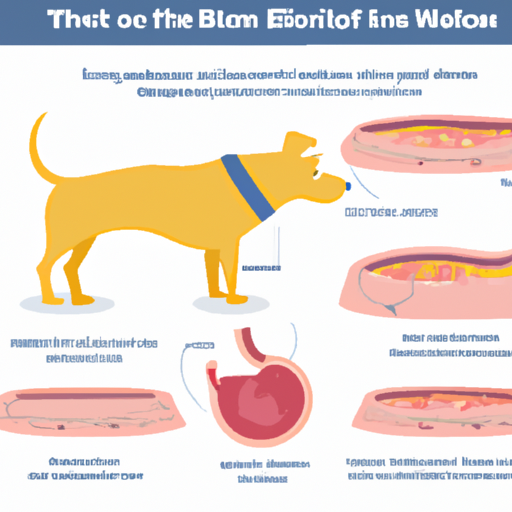Understanding Canine Bloat
You’ve probably heard about bloat in dogs, but do you really understand what it entails? Essentially, bloat, or gastric dilatation-volvulus (GDV), is a life-threatening condition that occurs when a dog’s stomach fills with gas and twists.
Like a ticking time bomb, the bloated stomach presses against nearby blood vessels, obstructing blood flow and causing the stomach tissues to die. If not addressed promptly, this can lead to shock, organ damage, and eventually, death.
Factors Leading to Bloat
A variety of factors may predispose your furry friend to bloat:
- Breed: Large breeds with deep chests like Great Danes, German Shepherds, and Boxers are more prone to bloat.
- Age: Older dogs are at a higher risk.
- Diet: A diet high in fat and fermentable fibers can increase the likelihood of bloat.
- Eating habits: Dogs that eat quickly or consume one large meal a day are more susceptible.
Recognizing the Symptoms
Knowing the signs of bloat can make all the difference. Here are some symptoms to watch out for:
- Restlessness or pacing
- Excessive drooling
- Swollen abdomen
- Attempts to vomit but unable to
- Rapid, shallow breathing
Preventive Measures
Prevention, as they say, is better than cure. Here’s what you can do to reduce the risk of bloat in your dog:
- Feed your dog smaller meals more frequently throughout the day.
- Avoid vigorous exercise or rough play right after meals.
- Consider a prophylactic gastropexy, a surgical procedure that tacks the stomach to the abdominal wall, for high-risk breeds.
Treating Bloat
Time is of the essence when dealing with bloat. The first step is to stabilize the dog and decompress the stomach to release the built-up gas. This table illustrates the typical treatment options:
| Treatment | Description |
|---|---|
| Decompression | A tube is passed down the esophagus to let out the gas. |
| Trocarization | A large-bore needle is inserted into the stomach through the skin to release the gas. |
| Surgery | If the stomach has twisted, surgery is required to untwist it and assess the damage. |
FAQ
1. What causes bloat in dogs?
The exact cause is unknown, but it involves a build-up of gas in the stomach and possible twisting of the stomach.
2. Are some breeds more prone to bloat?
Yes, large breeds with deep chests like Great Danes and German Shepherds are more susceptible.
3. What do I do if I suspect my dog has bloat?
Seek immediate veterinary attention. Bloat can be fatal if not treated promptly.
4. Can bloat be prevented?
While there’s no surefire way to prevent bloat, measures such as feeding smaller meals more frequently and avoiding vigorous exercise after meals can help reduce the risk.
Remember, as a caregiver, being knowledgeable and alert can save your dog’s life. Be aware, be prepared, and keep your canine companion safe from the perils of bloat.



